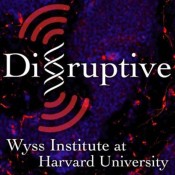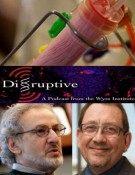Free Forum – JARED DIAMOND, COLLAPSE: How Societies Choose to Fail or Succeed.
Written on February 10th, 2017Originally aired April 2005
Environmental damage, climate change, rapid population growth and unwise political choices were all factors in the demise of these societies, but other societies found solutions and persisted. The subtitle claims “societies choose to fail or succeed.”
Disruptive: Synthetic Biology Pamela Silver & George Church
Written on February 21st, 2016
I’m excited to offer the first episode of DISRUPTIVE, my new monthly podcast series produced with Harvard’s Wyss Institute for Biologically Inspired Engineering. The mission of the Wyss Institute is to: Transform healthcare, industry, and the environment by emulating the way nature builds, with a focus on technology development and its translation into products and therapies that will have an impact on the world in which we live. Their work is disruptive not only in terms of science but also in how they stretch the usual boundaries of academia.
In this inaugural episode, Wyss core faculty members Pamela Silver and George Church explain how, with today’s technology breakthroughs, modifications to an organism’s genome can be conducted more cheaply, efficiently, and effectively than ever before. Researchers are programming microbes to treat wastewater, generate electricity, manufacture jet fuel, create hemoglobin, and fabricate new drugs. What sounds like science fiction to most of us might be a reality in our lifetimes: the ability to build diagnostic tools that live within our bodies, find ways to eradicate malaria from mosquito lines, or possibly even make genetic improvements in humans that are passed down to future generations. Silver and Church discuss both the high-impact benefits of their work as well as their commitment to the prevention of unintended consequences in this new age of genetic engineering.
DISRUPTIVE: BIO-INSPIRED ROBOTICS features three separate interviews with (1) RADHIKA NAGPAL, (2) ROBERT WOOD, and (3) CONOR WALSH
Written on October 15th, 2015Welcome to the second episode of my new monthly podcast series produced with Harvard’s Wyss Institute for Biologically Inspired Engineering.
DISRUPTIVE: BIO-INSPIRED ROBOTICS features three separate interviews with (1) RADHIKA NAGPAL, (2) ROBERT WOOD, and (3) CONOR WALSH. From insects in your backyard, to creatures in the sea, to what you see in the mirror, engineers and scientists at Wyss are drawing inspiration to design a whole new class of smart robotic devices
In this one, CONOR WALSH discusses how a wearable robotic exosuit or soft robotic glove can assist people with mobility impairments, as well as how the goal to create real-world applications drives his research approach.
In part one, RADHIKA NAGPAL talks about her work Inspired by social insects and multicellular systems, including the TERMES robots for collective construction of 3D structures, and the KILOBOT thousand-robot swarm. She also speaks candidly about the challenges faced by women in the engineering and computer science fields.
In part two, ROBERT WOOD discusses new manufacturing techniques that are enabling popup and soft robots. His team’s ROBO-BEE is the first insect-sized winged robot to demonstrate controlled flight.
The mission of the Wyss Institute is to: Transform healthcare, industry, and the environment by emulating the way nature builds, with a focus on technology development and its translation into products and therapies that will have an impact on the world in which we live. Their work is disruptive not only in terms of science but also in how they stretch the usual boundaries of academia.
http://wyss.harvard.edu/
– See more at:
DISRUPTIVE: BIO-INSPIRED ROBOTICS Radhika Nagpal Interview
DISRUPTIVE: BIO-INSPIRED ROBOTICS Robert Wood Interview
Conor Walsh’s interview transcript
http://aworldthatjustmightwork.com/2015/07/auto-draft-18/
DISRUPTIVE: CONFRONTING SEPSIS – Don Ingber and Mike Super
Written on October 14th, 2015Welcome to DISRUPTIVE the podcast from Harvard’s Wyss Institute for Biologically Inspired Engineering.
In this episode of DISRUPTIVE, we will focus on: CONFRONTING SEPSIS.
Sepsis is a bloodstream infection in which the body’s organs become inflamed and susceptible to failure. The leading cause of hospital deaths, sepsis kills at least eight million people worldwide each year. It can be caused by 6 species of fungi and 1400 species of bacteria. Diagnosis takes two to five days, and every hour you wait can increase the risk of death by 5-9%.
“Even with the best current treatments, sepsis patients are dying in intensive care units at least 30% of the time,” says one of today’s guests, Wyss Senior Staff Scientist Mike Super.
A new device developed by a team at Wyss may radically transform the way we treat sepsis. Their blood-cleansing approach can be administered quickly, even without identifying the infectious agent. In animal studies, treatment with this device reduced the number of targeted pathogens and toxins circulating in the bloodstream by more than 99%.
The mission of the Wyss Institute is to: Transform healthcare, industry, and the environment by emulating the way nature builds, with a focus on technology development and its translation into products and therapies that will have an impact on the world in which we live. Their work is disruptive not only in terms of science but also in how they stretch the usual boundaries of academia.
Don Ingber and Mike Super’s Interview transcript
DISRUPTIVE: BIO-INSPIRED ROBOTICS features three separate interviews with (1) RADHIKA NAGPAL, (2) ROBERT WOOD, and (3) CONOR WALSH
Written on October 7th, 2015
Welcome to the second episode of my new monthly podcast series produced with Harvard’s Wyss Institute for Biologically Inspired Engineering.
DISRUPTIVE: BIO-INSPIRED ROBOTICS features three separate interviews with (1) RADHIKA NAGPAL, (2) ROBERT WOOD, and (3) CONOR WALSH. From insects in your backyard, to creatures in the sea, to what you see in the mirror, engineers and scientists at Wyss are drawing inspiration to design a whole new class of smart robotic devices
In this one, ROBERT WOOD discusses new manufacturing techniques that are enabling popup and soft robots. His team’s ROBO-BEE is the first insect-sized winged robot to demonstrate controlled flight.
In part one, RADHIKA NAGPAL talks about her work Inspired by social insects and multicellular systems, including the TERMES robots for collective construction of 3D structures, and the KILOBOT thousand-robot swarm. She also speaks candidly about the challenges faced by women in the engineering and computer science fields.
In part three, CONOR WALSH discusses how a wearable robotic exosuit or soft robotic glove could assist people with mobility impairments, as well as how the goal to create real-world applications drives his research approach.
The mission of the Wyss Institute is to: Transform healthcare, industry, and the environment by emulating the way nature builds, with a focus on technology development and its translation into products and therapies that will have an impact on the world in which we live. Their work is disruptive not only in terms of science but also in how they stretch the usual boundaries of academia.
http://wyss.harvard.edu/
– See more at:
DISRUPTIVE: BIO-INSPIRED ROBOTICS Radhika Nagpal Interview
DISRUPTIVE: BIO-INSPIRED ROBOTICS Conor Walsh Interview
Robert Wood’s interview transcript




